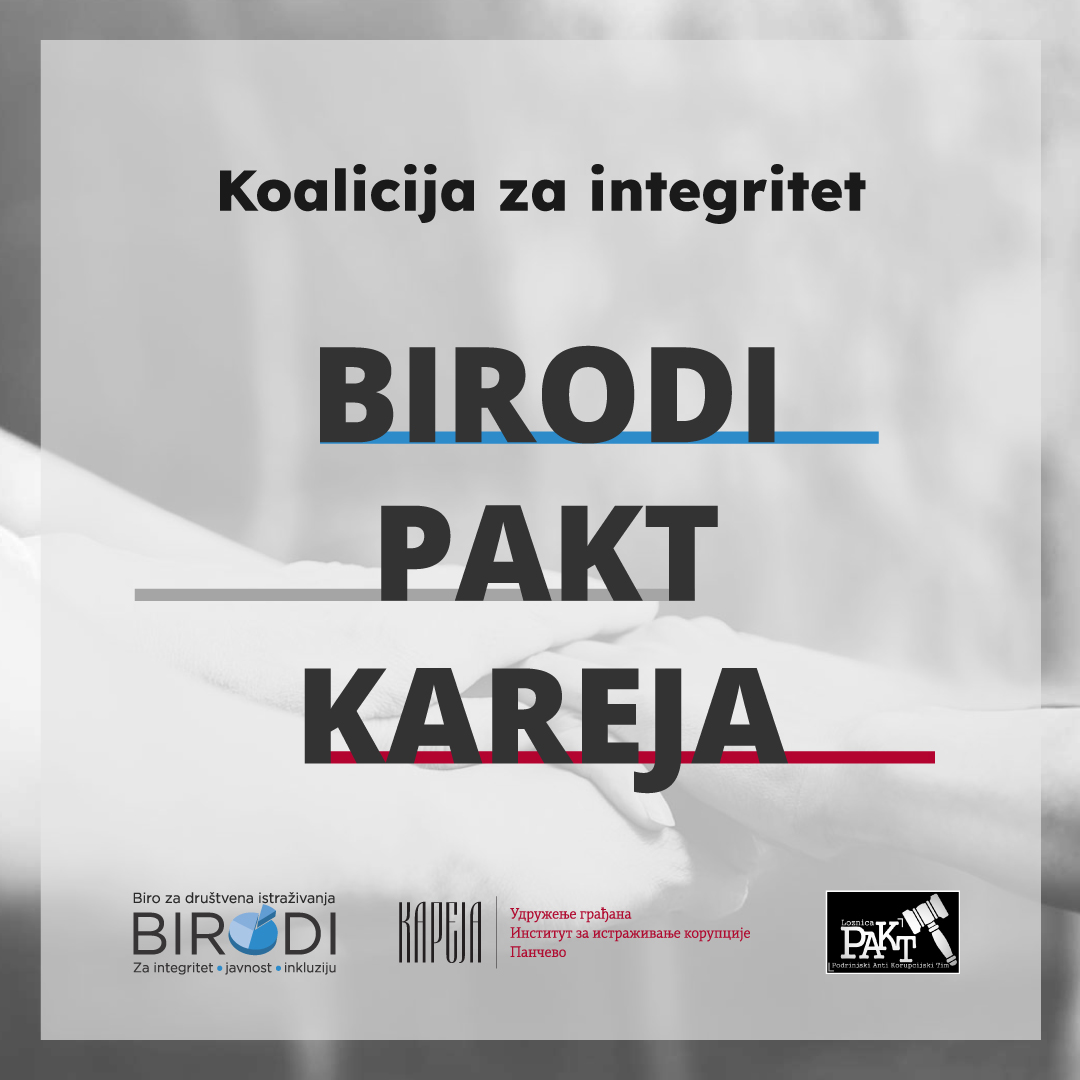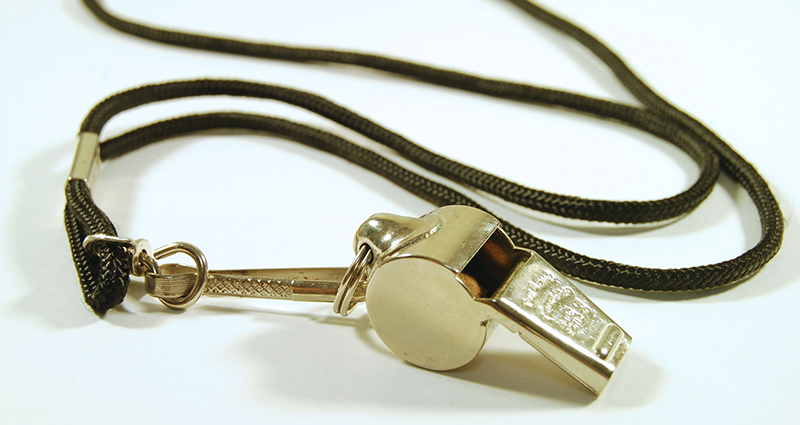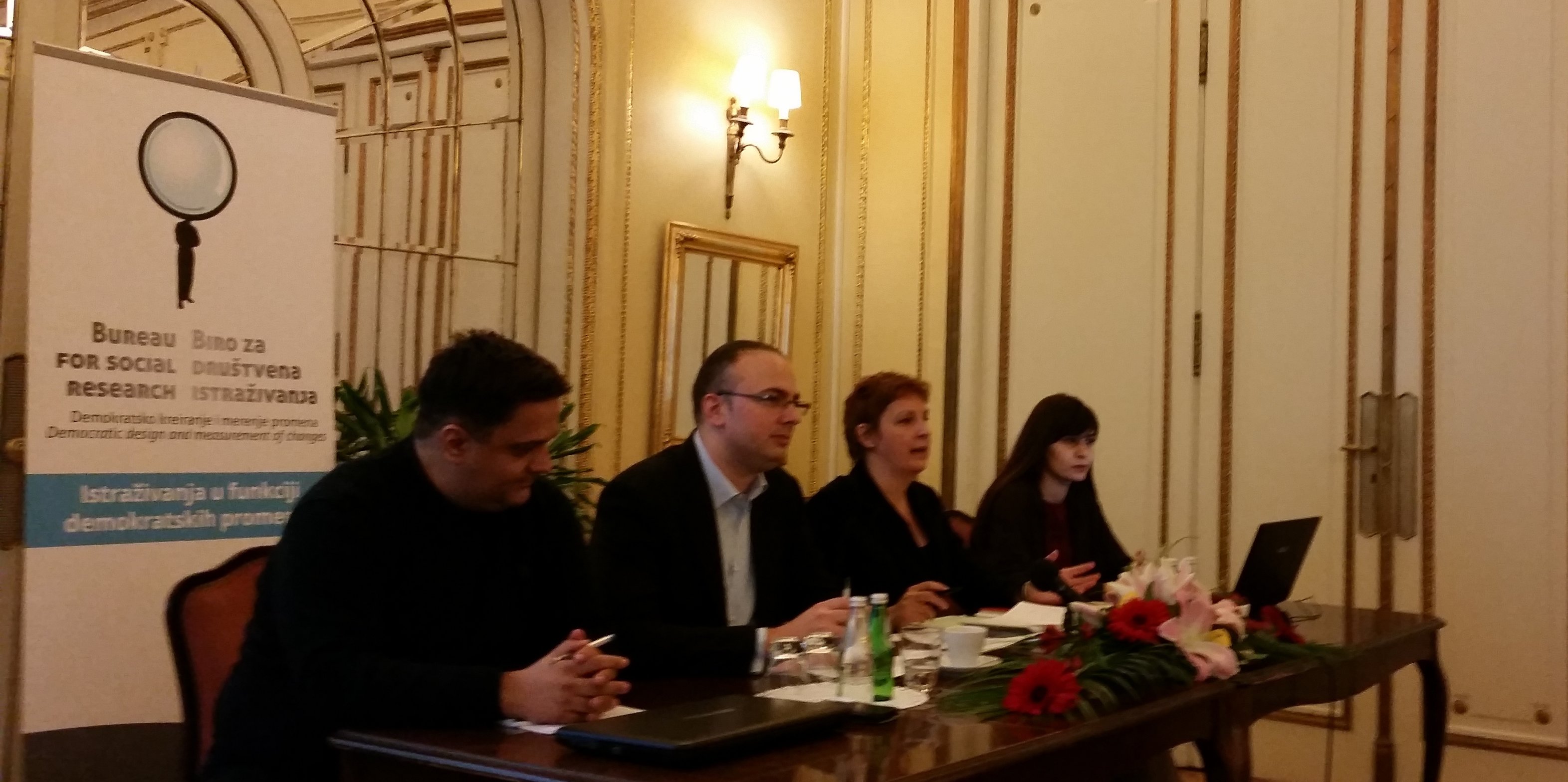Zahtev Koalicije za integritet GRECO – telu Saveta Evrope za vanrednim monitoringom u skladu za pravilom 34
Koalicija za integritet, koju čine Biro za društvena istraživanja, Podrinjsko antikorupcijski tim i Institut za istraživanje korupcije Kareja, a u skladu sa pravilom 34 GRECO – tela Saveta Evrope za borbu protiv korupcije zatražili su vanrednu evaluciju imajući u vidu narušavanje Ustava član 6 i Zakona o sprečavanju korupcije član 4o stav 2 u delu sukoba interesa što za posledicu ima stavljanje u zavisan položaj narodnih poslanika izabranih na listi SNS-a u odnosu na predsednika Republike. Nakon obraćanja Agenciji za sprečavanje korupcije nakon proteklih izbora sa zahvetom da se utvrdi zavisan položaj narodnih poslanika u odnosu na predsednika Republike i izostanka postupanja Agencije, rešili smo da se obratimo GRECO, čiji je Srbija član.
Obraćanje prednosimo u celosti:
Dear Sir/Madam,
I am writing to GRECO on behalf of the Integrity Coalition from Serbia, whose members include the Bureau for Social Research[1], Podrinje Anticorruption Team – PAKT[2] and the Institute for Research of Corruption – Kareja[3].
On Sunday, December 17th, parliamentary, provincial, and local elections took place in Serbia. The ODIHR report[4] highlighted a significant lack of integrity in these elections. One of the key issues identified in the report was the involvement of the President of the Republic of Serbia in these elections.
The ODIHR observation mission concluded that:
- The President of the Republic of Serbia did not distinguish his public function from his participation in the election process. He associated his own name with the list of the Serbian Progressive Party, „Aleksandar Vučić – Serbia Must Not Stop,“ of which he is a member. This action constitutes a breach of Article 111 of the Constitution of the Republic of Serbia and the 199 0OSCE Copenhagen Declaration, Article 5.4.
- The President of the Republic of Serbia utilized his public function and public events to promote the list of the Serbian Progressive Party, which contravenes Article 50 of the Law of Prevention of Corruption.
Public opinion has been shaped to perceive the events on December 17th in Serbia as presidential elections. According to the public opinion survey conducted by CRTA[5], 24% of respondents believed that presidential elections were held on December 17th. Additionally, in the CRTA public opinion survey, 60% of respondents believed that Vučić was one of the candidates in the elections.
The ODIHR observation mission’s report did not analyze the dependent status of the future members of the Parliament of the Republic of Serbia who were elected on the list „Aleksandar Vučić – Serbia Must Not Stop“ in relation to the President of the Republic of Serbia.
This situation represents a breach on a legal level, contravening Article 6 of the Constitution of Serbia[6] and Article 40 of the Law on Prevention of Corruption[7], which specifically regulate conflicts of interest.
This conflict of interest implies that the members of parliament will likely have the opportunity to protect their interests while enjoying the privileges of being parliamentarians, potentially aligning these interests with those connected to the Serbian Progressive Party.
Conversely, members of parliament are expected to exhibit significant loyalty by safeguarding the interests of Aleksandar Vučić as the President of the Republic of Serbia. They are also likely to shield themselves from repercussions in cases of unconstitutional behavior, especially considering the substantial public approval of the Serbian Progressive Party, reflected in public opinion polls four or more times.
Professor Tanasije Marinković from the Faculty of Law at the University of Belgrade demonstrated that, during his term as the President of the Republic of Serbia from 2017 to 2020, Aleksandar Vučić breached the Constitution approximately 25 times within the judicial domain[8].
Since 2017, Aleksandar Vučić has served as both President of the Republic of Serbia and President of the Serbian Progressive Party (SNS). In his role as SNS President, Vučić retains the right to propose the party’s candidate list for parliament, according to Article 45 of the SNS Statute[9].
This creates a potential conflict of interest between Vučić, who enjoys significantly higher public approval ratings than the SNS party as a whole, and the members of the National Assembly of Serbia who belong to the SNS. This dynamic has engendered a symbiotic relationship between the President of the Republic of Serbia, whose popularity surpasses that of the Serbian Progressive Party, and the members of the Parliament of the Republic of Serbia, who belong to the Serbian Progressive Party. These parliamentarians are constitutionally obliged by Article 118 of the Constitution of Serbia to oversee the President’s work.
The lack of sanctions or consequences for the control exerted by the President of the Republic of Serbia over the Parliament of the Republic of Serbia characterizes the ongoing situation. This trend is anticipated to persist in the new Serbian parliament, illustrating a clear instance of direct control exercised by the President over the Serbian Parliament.
We will present the examples of an indirect control.
Firstly, the director of the Anticorruption Agency (as per Article 13 of the Law on Prevention of Corruption) and members of the Council of the Anticorruption Agency (as per Article 24 of the same law) are elected in the Parliament of Serbia. This interconnection renders the director of the Anticorruption Agency and its council members reliant directly on members of Parliament and indirectly on the President of the Republic of Serbia.
Following the 2022 elections, we sought clarification on whether the Anticorruption Agency would investigate potential breaches of Article 42 concerning the dependent status of members of the Parliament of the Republic of Serbia. However, a clear response was not provided.
The ODIHR observation mission criticized the Anticorruption Agency’s passive role during the election campaign.
The behavior exhibited by the Anticorruption Agency is a consequence of direct influence from members of parliament and indirect influence from the President of the Republic of Serbia.
Secondly, the regulatory media body failed to present a report on media coverage during the election campaign. There is no information available regarding whether the regulatory media body sanctioned the breach of the Rulebook on the Protection of Human Rights in Media Services, Articles 4,5,6,7,8,26,27, and 29.
Notably, the members of the Council of the regulatory body are elected in the Parliament of Serbia.
Given the described circumstances, the Integrity Coalition invites GRECO to, based on Article 34, conduct an ad hoc evaluation in Serbia as a member state in GRECO. This evaluation is necessary due to issues concerning the independence, specialization, and means available to national bodies engaged in preventing and combating corruption (First Evaluation Round). Furthermore, it highlights concerns regarding conflicts of interest among members of Parliament (Fourth Evaluation Round).
[2] https://www.pakt.org.rs/sr/
[3] https://kareja.org.rs/galerija/
[4] https://www.osce.org/files/f/documents/6/8/560650_1.pdf
[6] http://www.ustavni.sud.rs/page/view/sr-Latn-CS/70-100028/ustav-republike-srbije
[7] https://www.paragraf.rs/propisi/zakon-o-sprecavanju-korupcije.html
[8] https://www.cepris.org/najnovije-vesti/u-susret-referendumu-da-li-je-vucic-stvarno-za/
[9] https://www.sns.org.rs/o-nama/statut-srpske-napredne-stranke



